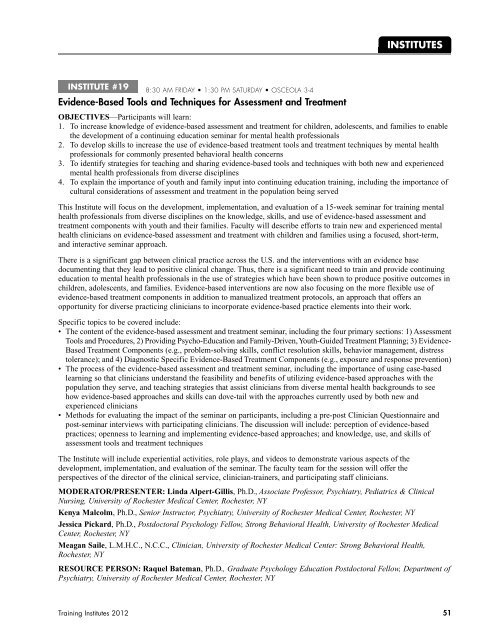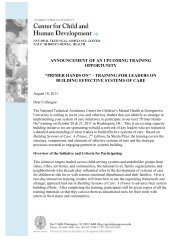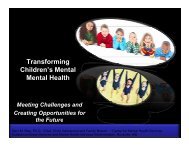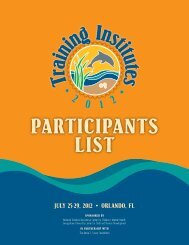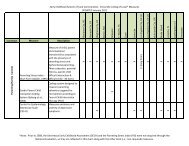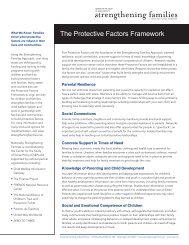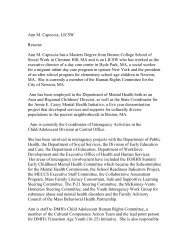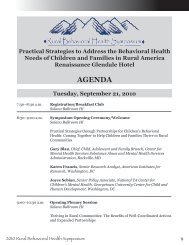Training Institutes 2012 - National Technical Assistance Center for ...
Training Institutes 2012 - National Technical Assistance Center for ...
Training Institutes 2012 - National Technical Assistance Center for ...
Create successful ePaper yourself
Turn your PDF publications into a flip-book with our unique Google optimized e-Paper software.
INSTITUTE #19 8:30 AM FRIDAY • 1:30 PM SATURDAY • OSCEOLA 3-4<br />
Evidence-Based Tools and Techniques <strong>for</strong> Assessment and Treatment<br />
INSTITUTES<br />
OBJECTIVES—Participants will learn:<br />
1. To increase knowledge of evidence-based assessment and treatment <strong>for</strong> children, adolescents, and families to enable<br />
the development of a continuing education seminar <strong>for</strong> mental health professionals<br />
2. To develop skills to increase the use of evidence-based treatment tools and treatment techniques by mental health<br />
professionals <strong>for</strong> commonly presented behavioral health concerns<br />
3. To identify strategies <strong>for</strong> teaching and sharing evidence-based tools and techniques with both new and experienced<br />
mental health professionals from diverse disciplines<br />
4. To explain the importance of youth and family input into continuing education training, including the importance of<br />
cultural considerations of assessment and treatment in the population being served<br />
This Institute will focus on the development, implementation, and evaluation of a 15-week seminar <strong>for</strong> training mental<br />
health professionals from diverse disciplines on the knowledge, skills, and use of evidence-based assessment and<br />
treatment components with youth and their families. Faculty will describe ef<strong>for</strong>ts to train new and experienced mental<br />
health clinicians on evidence-based assessment and treatment with children and families using a focused, short-term,<br />
and interactive seminar approach.<br />
There is a significant gap between clinical practice across the U.S. and the interventions with an evidence base<br />
documenting that they lead to positive clinical change. Thus, there is a significant need to train and provide continuing<br />
education to mental health professionals in the use of strategies which have been shown to produce positive outcomes in<br />
children, adolescents, and families. Evidence-based interventions are now also focusing on the more flexible use of<br />
evidence-based treatment components in addition to manualized treatment protocols, an approach that offers an<br />
opportunity <strong>for</strong> diverse practicing clinicians to incorporate evidence-based practice elements into their work.<br />
Specific topics to be covered include:<br />
• The content of the evidence-based assessment and treatment seminar, including the four primary sections: 1) Assessment<br />
Tools and Procedures, 2) Providing Psycho-Education and Family-Driven, Youth-Guided Treatment Planning; 3) Evidence-<br />
Based Treatment Components (e.g., problem-solving skills, conflict resolution skills, behavior management, distress<br />
tolerance); and 4) Diagnostic Specific Evidence-Based Treatment Components (e.g., exposure and response prevention)<br />
• The process of the evidence-based assessment and treatment seminar, including the importance of using case-based<br />
learning so that clinicians understand the feasibility and benefits of utilizing evidence-based approaches with the<br />
population they serve, and teaching strategies that assist clinicians from diverse mental health backgrounds to see<br />
how evidence-based approaches and skills can dove-tail with the approaches currently used by both new and<br />
experienced clinicians<br />
• Methods <strong>for</strong> evaluating the impact of the seminar on participants, including a pre-post Clinician Questionnaire and<br />
post-seminar interviews with participating clinicians. The discussion will include: perception of evidence-based<br />
practices; openness to learning and implementing evidence-based approaches; and knowledge, use, and skills of<br />
assessment tools and treatment techniques<br />
The Institute will include experiential activities, role plays, and videos to demonstrate various aspects of the<br />
development, implementation, and evaluation of the seminar. The faculty team <strong>for</strong> the session will offer the<br />
perspectives of the director of the clinical service, clinician-trainers, and participating staff clinicians.<br />
MODERATOR/PRESENTER: Linda Alpert-Gillis, Ph.D., Associate Professor, Psychiatry, Pediatrics & Clinical<br />
Nursing, University of Rochester Medical <strong>Center</strong>, Rochester, NY<br />
Kenya Malcolm, Ph.D., Senior Instructor, Psychiatry, University of Rochester Medical <strong>Center</strong>, Rochester, NY<br />
Jessica Pickard, Ph.D., Postdoctoral Psychology Fellow, Strong Behavioral Health, University of Rochester Medical<br />
<strong>Center</strong>, Rochester, NY<br />
Meagan Saile, L.M.H.C., N.C.C., Clinician, University of Rochester Medical <strong>Center</strong>: Strong Behavioral Health,<br />
Rochester, NY<br />
RESOURCE PERSON: Raquel Bateman, Ph.D., Graduate Psychology Education Postdoctoral Fellow, Department of<br />
Psychiatry, University of Rochester Medical <strong>Center</strong>, Rochester, NY<br />
<strong>Training</strong> <strong>Institutes</strong> <strong>2012</strong><br />
51


